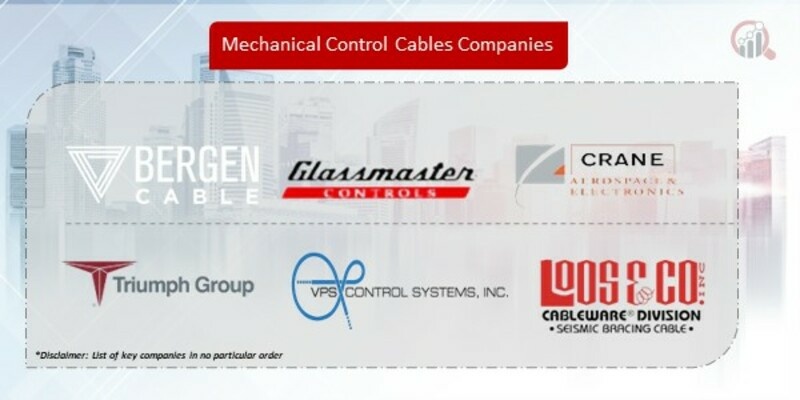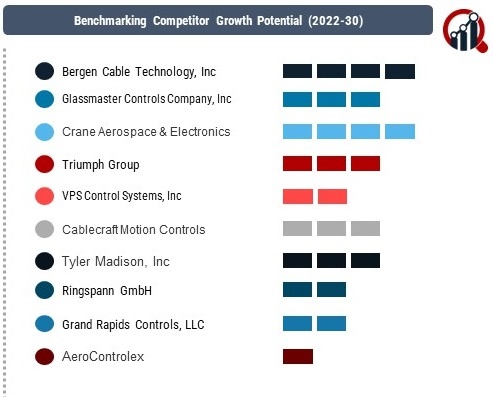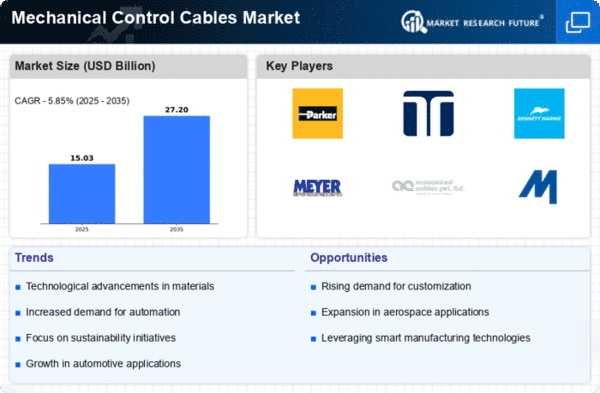Top Industry Leaders in the Mechanical Control Cables Market

Key Players Steering the Market:
At the forefront of the mechanical control cables market are key players
- Bergen Cable Technology, Inc
- Glassmaster Controls Company, Inc
- Crane Aerospace & Electronics
- Triumph Group
- VPS Control Systems, Inc
- Cablecraft Motion Controls
- Tyler Madison, Inc
- Ringspann GmbH
- Grand Rapids Controls, LLC
- AeroControlex
- Wescon Controls
- Drallim Industries Limited
- Loos & Co. Inc
- Orscheln Products
- Elliott Manufacturing
Strategic Endeavors and Market Dynamics:
The competitive landscape is shaped by strategic initiatives undertaken by these key players. Mergers and acquisitions, strategic collaborations, and product innovation have become instrumental in gaining a competitive edge. For instance, TE Connectivity's strategic alliances with key end-users and its focus on product diversification have allowed it to maintain a strong market presence. Similarly, Loos & Co. Inc. has demonstrated agility by adapting its product portfolio to align with emerging industry trends, ensuring a robust market position.
Factors Driving Market Share Analysis:
Market share analysis in the mechanical control cables segment is influenced by several factors. Quality, reliability, and compliance with industry standards are crucial determinants, with end-users placing significant emphasis on these aspects. Moreover, the ability to offer customized solutions that cater to specific industry requirements plays a pivotal role in capturing market share. Additionally, companies that invest in research and development to introduce innovative products with enhanced performance characteristics gain a competitive advantage, further influencing market share dynamics.
New and Emerging Players:
The mechanical control cables market is not only dominated by established players but also showcases a growing presence of new and emerging companies. Start-ups and innovative ventures, such as Cable Solutions Worldwide Ltd. and Cable-Tec Cables & Controls Ltd., are making significant strides by introducing novel technologies and solutions. These companies leverage agility and niche expertise to address specific market demands, presenting a challenge to traditional market leaders. As they continue to gain recognition, the competitive landscape is becoming more diverse, fostering innovation and healthy competition.
Industry News:
Recent developments and industry news indicate the evolving nature of the mechanical control cables market. Collaborations between key players and technology providers are becoming more prevalent, leading to the integration of smart technologies in control cable systems. This convergence is reshaping the industry, enhancing functionalities such as remote monitoring, predictive maintenance, and real-time data analytics. Moreover, environmental sustainability is emerging as a key theme, with companies increasingly focusing on developing eco-friendly and energy-efficient solutions.
Current Company Investment Trends:
Investment trends within the mechanical control cables market underscore the strategic priorities of companies. Capital expenditure in research and development remains a focal point, with companies allocating resources to enhance product performance, durability, and safety features. Furthermore, investments in manufacturing capabilities and supply chain optimization are aimed at ensuring efficient production processes and timely delivery to meet growing market demands. Companies are also allocating funds for digital transformation initiatives, embracing technologies such as IoT and automation to streamline operations and offer value-added services to customers.
Overall Competitive Scenario:
the competitive landscape of the mechanical control cables market is characterized by a blend of established players, innovative newcomers, and strategic collaborations. Key industry leaders are navigating market dynamics through a combination of product diversification, strategic alliances, and technological advancements. Market share analysis is influenced by factors such as quality, reliability, and customization capabilities, with an increasing emphasis on sustainability and smart technologies. As new and emerging companies disrupt the market with innovative solutions, the industry is poised for continued evolution, presenting both challenges and opportunities for participants across the value chain. In this dynamic environment, companies that can adapt to changing customer needs and embrace technological advancements will likely thrive, shaping the future trajectory of the mechanical control cables market.
Triumph Group:
Acquired Crane Aerospace & Electronics, strengthening their position in military and aerospace control cable markets.
Developed next-generation push-pull control cables with enhanced fatigue life and resistance to environmental corrosion.
Focus on integrating advanced materials and innovative manufacturing processes for lightweight and high-performance solutions.
Elliott Manufacturing:
Achieved significant growth in commercial aviation applications, catering to both OEMs and aftermarket maintenance needs.
Implemented lean manufacturing practices for improved efficiency and cost reduction.
Expanding capabilities for producing complex cable assemblies and custom engineered solutions.











